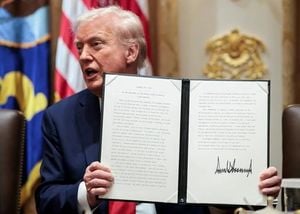As the war in Ukraine grinds through its fourth year, a remarkable political overture is unfolding between Kyiv and Washington. This week, Ukrainian President Volodymyr Zelenskyy openly floated the idea of nominating U.S. President Donald Trump for the Nobel Peace Prize—an audacious move designed to appeal to Trump’s well-known desire for global recognition and, perhaps more crucially, to secure the advanced weaponry Ukraine says it needs to tip the balance against Russia.
The overture, reported on October 9, 2025, comes at a pivotal moment. The Nobel Peace Prize winner for this year is set to be announced in days, but Zelenskyy’s comments were less about the timing of the prize and more about sending a signal to the White House. According to Politico, Zelenskyy told reporters that Ukraine would nominate Trump if he could help secure a ceasefire with Russian President Vladimir Putin—an offer that merges flattery with strategic calculation.
"Right now, it is important to send a signal that Ukraine will be strengthened by all means possible. And this is one of those means that is important to me – Tomahawks," Zelenskyy said, referencing the long-range Tomahawk cruise missiles Kyiv has been requesting for months. The missiles, which can strike targets up to 1,550 miles away, would allow Ukraine to hit deep inside Russian territory, including as far as Siberia. While former President Joe Biden rejected Ukraine’s appeals for these weapons, Zelenskyy expressed renewed hope that Trump might be more amenable. "All such things can strengthen Ukraine and force the Russians to sober up a little, sit down at the negotiating table," he added, as quoted by The Independent.
The diplomatic courtship is not one-sided. President Trump has made no secret of his desire to be recognized as a peacemaker. He has repeatedly claimed—albeit controversially—that he has "settled seven wars" since returning to office in January 2025. While those assertions are disputed, there’s no question that Trump has tried to position himself as a dealmaker on the world stage, especially regarding the conflict in Ukraine.
Senator Roger Wicker of Mississippi, writing in the Mississippi Press on October 8, 2025, voiced strong support for Trump’s recent declaration that Ukraine can win the war. Wicker cited Trump’s argument that Russia’s economy is weakening and that, after three and a half years of fighting, the Kremlin has failed to subdue Ukraine—a country with a much smaller population and military. "Russia has been fighting aimlessly for three and a half years a war that should have taken a real military power less than a week to win," Trump reportedly summarized.
Wicker’s commentary highlighted a shift in Western perceptions. When Russia launched its invasion in February 2022, many predicted Kyiv would fall within days. Instead, the Ukrainian armed forces have mounted a tenacious defense for over 1,300 days, defying early expectations. As Wicker put it, observers are now reassessing both Ukraine’s resolve and Russia’s capabilities.
Yet, despite Ukraine’s resilience, the war has grown more brutal. Putin has repeatedly refused to engage honestly in peace talks, even escalating his campaign of air strikes. In February 2025, marking the third anniversary of the invasion, Russia launched its largest drone strike yet. The following month, after Ukraine agreed to a ceasefire, Putin responded with a barrage of missiles and drones, killing nine children in a residential neighborhood. Over the summer, the attacks intensified, with Putin breaking his own records for drone strikes in May, July, and September. The September assault saw over 800 drones deployed against civilian and government targets—a horrifying new benchmark in the conflict.
"He talks nice and then he bombs everybody," Trump remarked this summer, according to Wicker. The U.S. president’s frustration with Putin’s duplicity appears to have influenced his evolving stance. Initially, Trump was willing to open the door to peace talks, but as Putin’s aggression continued, the U.S. has signaled a firmer alignment with Ukraine.
One of the most contentious issues now is whether the U.S. will provide Ukraine with Tomahawk missiles. Zelenskyy said he first broached the subject with Trump a year ago, before Trump’s second term began. At their last meeting at the UN General Assembly, Trump reportedly "promised to work on a technical level and consider such a possibility." As of October 6, Trump said he had "sort of made a decision" on the missiles, but wanted to "find out what they’re doing with them." The implication is that the U.S. is weighing both the potential benefits for Ukraine and the risks of escalation with Russia.
Putin, for his part, has warned that delivering Tomahawks to Ukraine would be seen as a major escalation and could threaten U.S.-Russia relations. The missiles can only be used with American permission, underscoring Washington’s pivotal role in the conflict’s next phase.
Meanwhile, the war’s destructive logic has spilled over into Russian territory. On October 5, Ukrainian forces damaged energy infrastructure in the Russian city of Belgorod, leaving nearly 40,000 residents without electricity. Zelenskyy made clear that such actions are retaliatory. "We told them they must understand: if they want to blackout us, we will do the same. [Russia] must feel the price of this war. But we are not killing civilians," he told reporters, as reported by The Independent.
Trump’s support for continuing arms sales to NATO, which in turn supports Ukraine, has also been framed as a way to strengthen both American industry and Ukraine’s defense. Wicker emphasized that selling weapons to NATO not only supports American jobs and the defense industrial base but also "impose[s] severe costs on Putin and help[s] Ukraine’s chances for victory."
In the end, the Nobel Peace Prize overture is more than a symbolic gesture. It’s a calculated move by Ukraine to secure the advanced weaponry and diplomatic support it desperately needs, while also appealing to Trump’s hunger for legacy-defining achievements. Whether this gambit will yield the desired results remains to be seen, but it highlights the complex interplay of power, persuasion, and ambition at the heart of the world’s most dangerous conflict.
As the war in Ukraine rages on, the stakes for peace—and for the politicians seeking to broker it—have rarely been higher.




